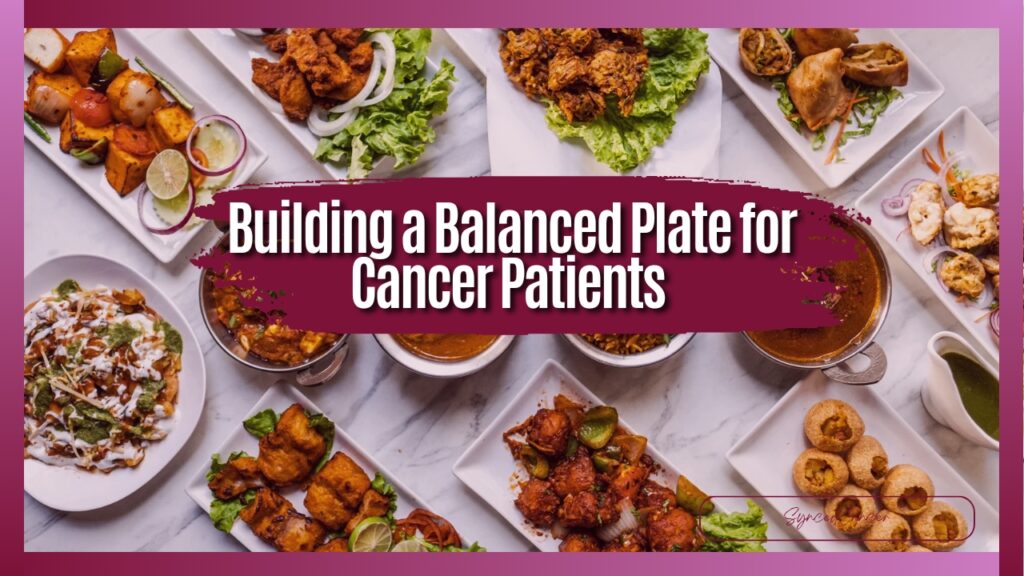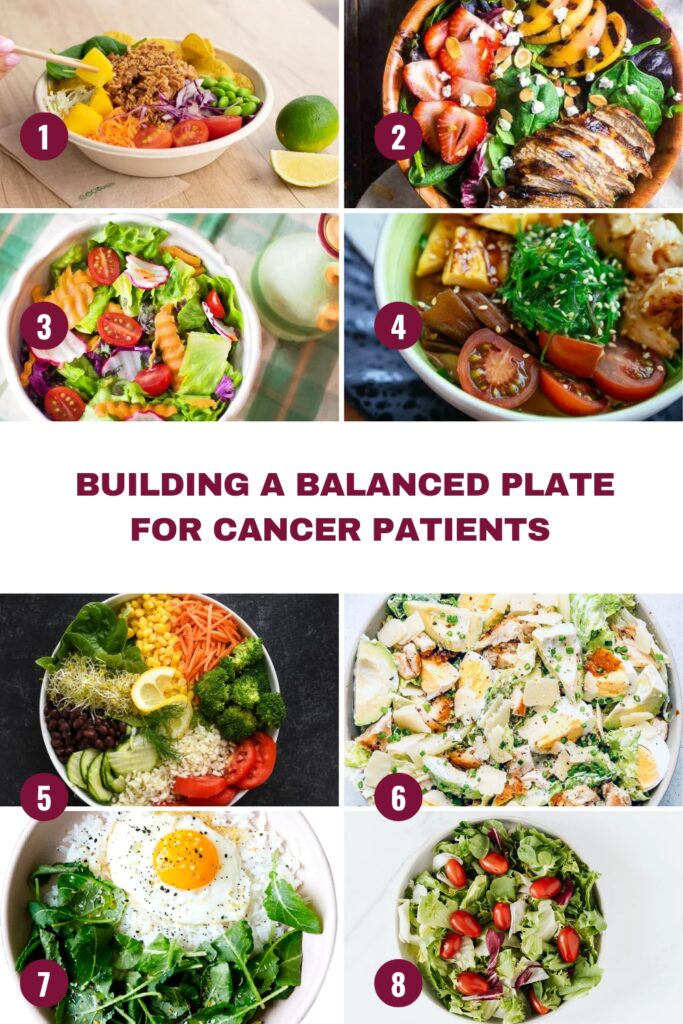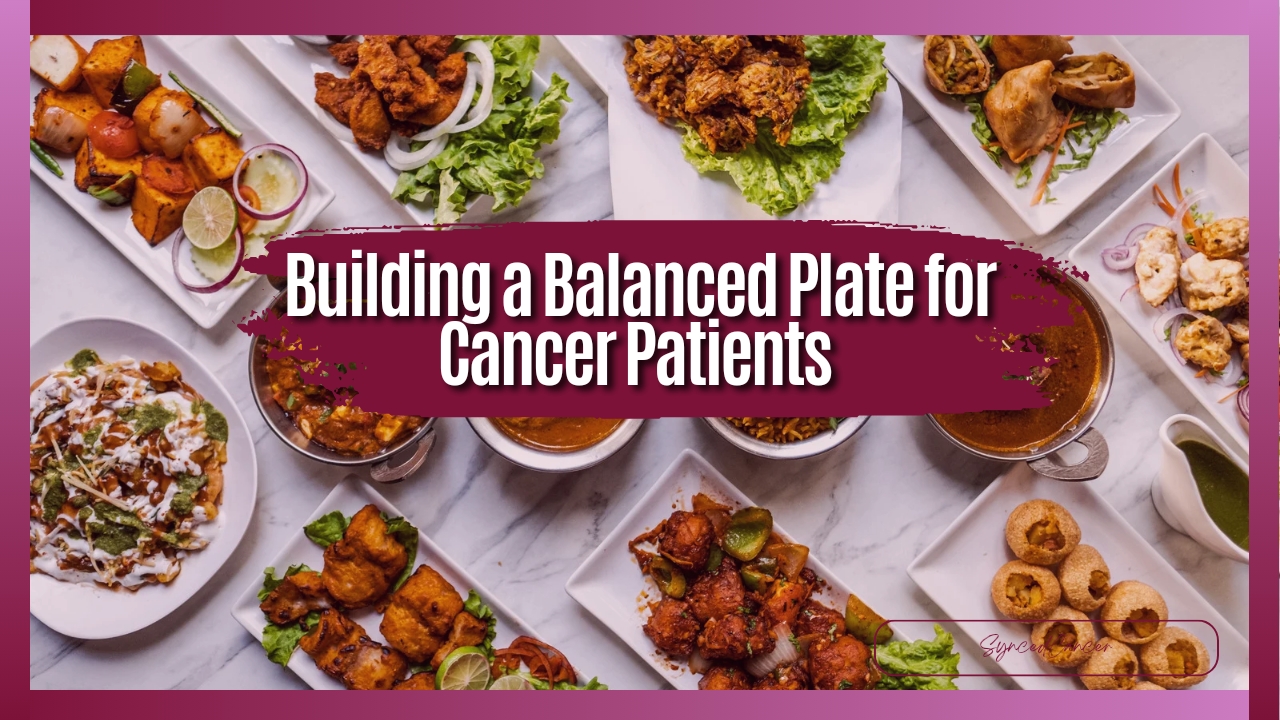Cancer treatment often brings about changes in appetite, digestion, and nutrient absorption, making it crucial to maintain a balanced diet for cancer patients to support their health and well-being. A well-balanced meal can help manage symptoms, support treatment effectiveness, and improve overall quality of life. In this blog post, we’ll explore the key components of a balanced diet for cancer patients, focusing on nutrients that play a vital role in managing symptoms and supporting the body’s healing process.

The Importance of Variety in Nutrition for Cancer Patients
- Supporting Immune Function: A diverse range of nutrients is vital for bolstering the immune system, which plays a critical role in fighting off infections and supporting the body’s defense against cancer cells. Vitamins A, C, D, E, and minerals like zinc and selenium are known for their immune-boosting properties. These nutrients can be found in a variety of foods such as fruits, vegetables, nuts, seeds, lean proteins, and whole grains. Incorporating a colorful array of fruits and vegetables ensures a rich supply of antioxidants, which help combat oxidative stress and inflammation, supporting immune health.
- Sustaining Energy Levels: Cancer treatments, such as chemotherapy and radiation therapy, can cause fatigue and impact energy levels. Therefore, maintaining adequate energy intake becomes paramount for cancer patients to support their daily activities and enhance their quality of life. Carbohydrates serve as the primary source of energy, and including complex carbohydrates from whole grains, fruits, and vegetables provides sustained energy release and helps prevent blood sugar spikes and crashes. Additionally, incorporating lean proteins and healthy fats into meals and snacks helps stabilize blood sugar levels and provides longer-lasting energy. Variety in food choices ensures a diverse supply of nutrients, including vitamins and minerals, necessary for energy metabolism and overall vitality.
- Promoting Overall Health: A varied diet not only supports immune function and energy levels but also contributes to overall health and well-being for cancer patients. Adequate intake of essential nutrients, including protein, vitamins, minerals, and phytonutrients, supports various physiological processes, including tissue repair, hormone synthesis, and cellular function. Lean proteins aid in muscle maintenance and repair, while vitamins and minerals play vital roles in bone health, wound healing, and cognitive function. Furthermore, phytonutrients found in plant-based foods possess anti-inflammatory and antioxidant properties, which may help alleviate treatment-related side effects and reduce the risk of cancer recurrence.

Balanced Plate Components and their importance
- Fruits and Vegetables: Rich in vitamins, minerals, antioxidants, and fiber, fruits and vegetables should form the foundation of a balanced diet for cancer patients. Aim for a variety of colorful options to ensure a diverse range of nutrients. Dark leafy greens, berries, citrus fruits, and cruciferous vegetables like broccoli and Brussels sprouts are particularly beneficial.
- Whole Grains: Whole grains such as brown rice, quinoa, oats, and whole wheat bread over refined grains. Whole grains provide fiber, which aids in digestion and helps regulate blood sugar levels. They also contain essential nutrients like B vitamins and iron, which are important for energy production and immune function.
- Lean Proteins: Protein is essential for tissue repair, immune function, and maintaining muscle mass during cancer treatment. Choose lean protein sources such as poultry, fish, tofu, legumes, and nuts. Incorporating a variety of protein sources ensures a diverse array of amino acids, the building blocks of protein.
- Healthy Fats: Include sources of healthy fats in your diet, such as avocados, nuts, seeds, and olive oil. These fats provide energy, support nutrient absorption, and have anti-inflammatory properties. Omega-3 fatty acids, found in fatty fish like salmon and flaxseeds, may also help reduce inflammation and improve treatment outcomes.
- Dairy or Dairy Alternatives: Dairy products and fortified dairy alternatives like almond milk or soy milk provide calcium and vitamin D, which are important for bone health. Choose low-fat or non-fat options to limit saturated fat intake, especially if managing weight is a concern.
- Hydration: Staying hydrated is essential for achieving balanced diet for cancer patients, especially during cancer treatment. Aim to drink plenty of water throughout the day, and include hydrating foods such as fruits, vegetables, and broth-based soups.
- Balanced Plate Components and their importance: Minimize consumption of processed foods, sugary snacks, and sugary beverages, as these can contribute to inflammation, weight gain, and other health issues. Instead, focus on whole, nutrient-dense foods that nourish the body and support healing.
Tips for managing dietary restrictions due to treatment side effects.
- Consult with a Registered Dietitian: Work with a registered dietitian or nutritionist who specializes in oncology to develop a personalized eating plan tailored to your specific needs, treatment regimen, and side effects. They can provide guidance on managing dietary restrictions that can help in maintaining balanced diet for cancer patients.
- Addressing Nausea and Vomiting
- Eat small, frequent meals throughout the day rather than large meals.
- Choose bland, easily digestible foods such as crackers, toast, rice, and bananas.
- Avoid strong-smelling or greasy foods that may trigger nausea.
- Stay hydrated by sipping on clear fluids like water, herbal tea, or ginger ale.
- Dealing with Taste Changes:
- Experiment with different flavors and textures to find foods that are palatable.
- Try marinating meats or adding herbs, spices, or citrus to enhance flavor.
- Cold or room temperature foods may be better tolerated than hot foods.
- Use plastic utensils if you experience a metallic taste from metal utensils.
- Managing Mouth Sores and Difficulty Swallowing:
- Choose soft, moist, and easy-to-swallow foods such as smoothies, yogurt, pudding, and pureed soups.
- Avoid acidic, spicy, or rough-textured foods that may irritate the mouth.
- Rinse your mouth with a saltwater solution before and after meals to help reduce inflammation and prevent infection.
- Stay hydrated by drinking cool, soothing liquids like water, broth, or fruit juice.
- Coping with Changes in Appetite and Weight Loss:
- Focus on calorie-dense, nutrient-rich foods to maximize nutrition even if appetite is poor.
- Incorporate healthy fats such as avocados, nuts, seeds, and olive oil to boost calorie intake.
- Drink high-calorie, high-protein shakes or nutritional supplements between meals to increase calorie and protein intake.
- Keep snacks readily available and eat small portions frequently throughout the day.
- Managing Digestive Issues:
- Choose easily digestible foods such as rice, bananas, applesauce, and toast if experiencing diarrhea.
- Increase fiber intake gradually if constipation is an issue, and stay hydrated by drinking plenty of fluids.
- Limit gas-producing foods such as beans, cabbage, and carbonated beverages if experiencing bloating or gas.
- Stay Hydrated:
- Drink plenty of fluids throughout the day, including water, herbal tea, broth, and electrolyte-rich beverages.
- Avoid caffeine and alcohol, which can contribute to dehydration.
Conclusion
Building a balanced plate for cancer patients involves incorporating a variety of nutrient-rich foods to support immune function, sustain energy levels, and promote overall health during treatment. By focusing on whole, minimally processed foods and staying hydrated, cancer patients can optimize their nutrition to manage symptoms, support treatment effectiveness, and improve quality of life. Working with a healthcare team, including a registered dietitian, can help provides guidance, support and ensure that dietary needs are met and individualized recommendations are provided tailored to their specific needs and preferences.
REFERENCES
Johns Hopkins Medicine – https://www.hopkinsmedicine.org/
Assessed 5th April, 2024










What do you think?
It is nice to know your opinion. Leave a comment.